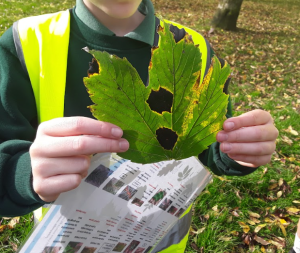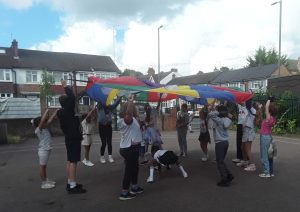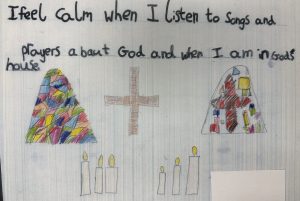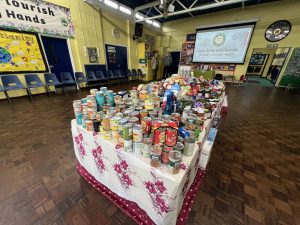’For a human being, especially a child or young person, to have a full quality of life, spirituality in all its aspects must be nurtured and affirmed.’
John Bradford (1995)
Children are spiritual beings by nature and we have seen so much evidence of this in school. Robert Coles who has written a lot about spirituality and children in worship says that ‘children are active agents who walk with adults on the journey of life’. He suggests that children are spiritual pilgrims who march through life as they seek God, ask questions, discover answers and wonder about what lies ahead of them.
What is spiritual development?
Spiritual development differs from person to person and is a very personal experience. For this reason, it is difficult to put into words. Spirituality concerns a person’s relationship with themselves, with others, with God (or the transcendent), and with nature and the environment. Spirituality is not the same as having a religion or faith; a person can be spiritual without having a particular faith.
In keeping with our Christian Vision, we recognise that we are all created in God’s image and have a spiritual dimension to our existence. We nurture this through the academic rigour we bring to our work and through our passion to help children and adults to flourish and achieve their God given potential.
The four elements of spiritual development – these consist of:
Self
- Awareness of feelings; ability to reflect and express
- Awareness of our uniqueness; happiness with who we are
- Gratitude for the things we have and the person we are
- Exploration of personal faith
- Development of imagination and creativity
Others
- Empathy and understanding; respect
- To love and be loved (loving your neighbour)
- Making a difference; duty
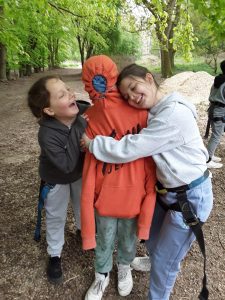
Transcendence (Beyond)
- Encountering/experiencing God (having a sense of what lies beyond the material/physical)
- Ability to ask and discuss the ‘Big Questions’ (eg about life, death, suffering, nature of God)
- Opportunities for prayer, connecting with God
- Making sense of the world
Nature
- Developing a sense of awe and wonder
- Enjoying the miracles of everyday life
- Taking time for what really matters
- Appreciating beauty in art, music, nature
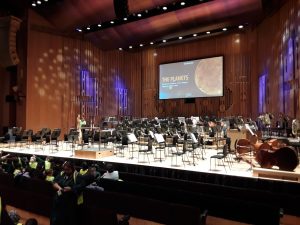
How we aim to nurture spirituality
Children’s spiritual development is nurtured through all aspects of our provision. We believe it is important to develop strong relationships using our school Vision and Values as well as the development of knowledge, concepts, skills and attitudes. We give children (and staff) opportunities to:
- Have regular time in the day for quiet and reflection. This might be listening to a story, lighting the candles in worship, listening to music, use of the reflection areas around school or the prayers in school.
- Have opportunities for creativity and using their imagination
- Singing as part of our daily worship
- Explore, express, share and compare feelings and opinions. This is planned into all subjects across our curriculum but it more focused within our PSHE/ RSE using the Jigsaw scheme, worship and RE lessons. Other structures such as Restorative Practice, Metacognition, Growth Mindset, Mindfulness and ‘I wonder’ questions, are used to support this further.
- Constantly reaffirm the importance of relationships. How we talk to and relate with each other is fundamental.
- Express awe and wonder, appreciate beauty in all its forms, and appreciate the connections and unity in the world.
- Encourage each other to admit mistakes and finding ways to make situations better. Recognising and owning up to faults is an important process that allows us to heal and grow from our experiences.
- Encourage everyone to show kindness, caring and compassion, and to express these in practical ways. (eg: how we treat each other every day; charitable works; through prayer spaces)
- Explore ‘Big Questions’ – particularly through our RE curriculum and worship.
- Read often, giving them opportunities to discuss and reflect. This includes both secular and religious texts, in particular the Bible.
- Begin to develop their own system of beliefs, which may or may not include religious beliefs.
- Reflect on the situations of others through role play or stories.
- Acknowledging and sharing ‘wow’ spiritual moments that staff have experienced.
Take a look at our overview document showing different ways that we Nurture Spirituality across the 4 strands of self, others, transcendent and nature
We have also co-produced a document with subject leaders to show how Spirituality is woven across the curriculum at St. Mary’s: Spirituality Across the Curriculum
Ultimately, our ambition ts to ensure that children and staff feel loved, held, guided and never alone. We are firm in our belief that these spiritual securities help to galvanise our connections and relationships at St. Mary’s School.

May Day in all its glory
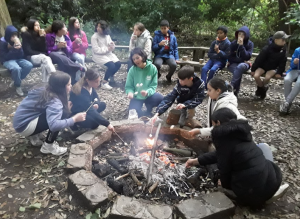
Coming together around the camp fire
